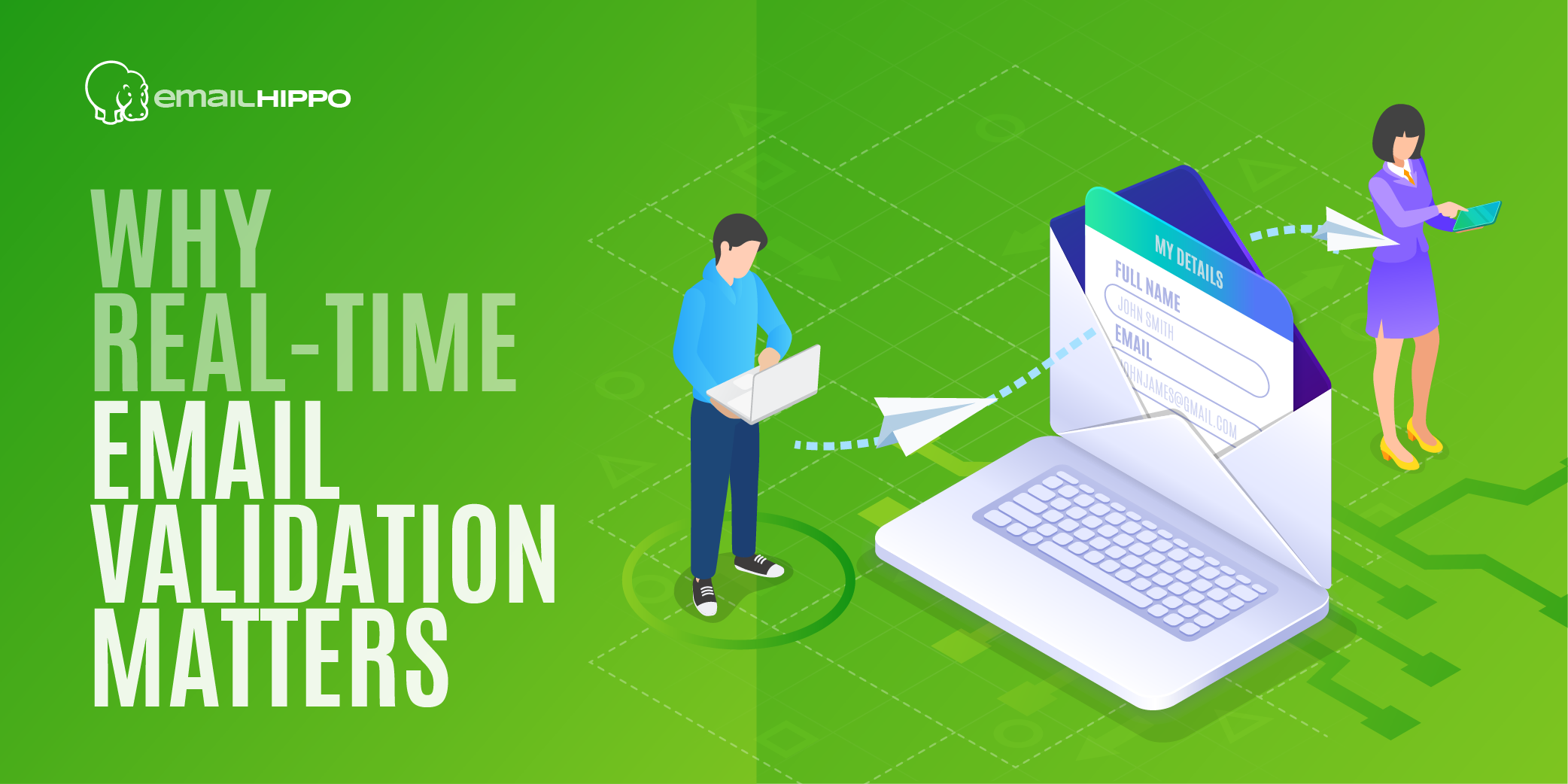.jpg?width=800&height=400&name=pexels-olia-danilevich-4974914%20(1).jpg)
Email validation is a crucial process for any business that relies on email marketing campaigns to reach out to its audience. For data providers, who sell data to businesses, it's even more important to ensure that the data you provide is clean and accurate. In this blog post, we will explore the different types of email validation to be aware of to ensure the data you sell is of high quality.
Syntax validation
Syntax validation is the simplest form of email validation. It checks whether the email address is properly formatted and follows the syntax rules set by the Internet Engineering Task Force (IETF). Although there are other rules that email addresses need to adhere to, syntax rules specify that an email address must contain an "@" symbol and a domain name, with a maximum of 64 characters for the local part and 255 characters for the domain name.
Syntax validation can quickly identify email addresses that are invalid or incorrectly formatted. However, it cannot determine whether the email address is active or whether the owner of the email address has opted out of receiving marketing emails.
By performing syntax validation, data providers can ensure that the format of the email address complies with the RFC standards. This can reduce the time and resources spent on error correction and reprocessing of data, which can be costly.
In summary, syntax validation is a crucial step in ensuring the accuracy and completeness of data, and data providers should consider it as an essential part of their data validation process.
Regular expression validation
Regular expressions are a powerful tool for validating data, as they provide a flexible and precise way to describe the required format or pattern. It’s important to note that, though this approach can be used to apply syntax validation or other rules to suit a target audience, the level of regular expression and syntax validation can vary.
Regular expression validation involves checking the data against a predefined regular expression pattern to ensure that it matches the required format or pattern. For example, a regular expression can be used to validate email addresses, phone numbers, postal codes, or any other type of data that has a specific format or pattern.
By performing regular expression validation, data providers can help to reduce the risk of data processing errors or incorrect results, and improve the quality of the data provided.
Regular expression validation can also help data providers to enforce data standards and improve data consistency, by ensuring that the data conforms to a predefined format or pattern.
Role-based email validation
Role-based email validation helps to improve the accuracy and relevance of their data, particularly in cases where the data is used for marketing or communication purposes.
Role-based email addresses are email addresses that are not tied to an individual but rather to a job or function within an organisation, such as "sales@company.com" or "info@company.com." These email addresses are often monitored by multiple people and are not intended for personal use.
Role-based email validation involves checking the email address against a list of known role-based email addresses to determine if it is a personal or role-based email address. If it is a role-based email address, additional checks may be performed to ensure that the email address is valid and active.
By performing role-based email validation, data providers can help to improve the effectiveness of marketing campaigns and reduce the risk of emails being sent to irrelevant or inappropriate recipients.
In summary, role-based email validation is an important step in ensuring the accuracy and relevance of email addresses provided by data providers, particularly in cases where the data is used for marketing or communication purposes. By understanding if the email address is a role email address or an individual person, you can determine whether you are sending an email or its specific content to deliver the best outcome.
By performing role-based email validation, data providers can improve the quality of their data and provide more value to their end-users.
Domain validation
Domain validation is the process of checking whether the domain name in an email address is valid and exists. It verifies whether the domain name has a valid DNS record and can receive email messages. Domain validation is normally used after syntax validation because it checks whether the email address has a functioning domain name.
Domain validation may also include the identification of disposable email addresses, which are temporary email addresses that users create to avoid spam or for one-time use.
Mailbox validation
Mailbox validation is the most comprehensive form of email validation. It checks whether the email address exists and is active by conversing with an email server about the email address and waiting for a response on whether it is valid.
Mailbox validation can identify whether the email address is valid, invalid, or a spam trap. Spam traps are email addresses created to catch spammers who send unsolicited emails. If a data provider sends out a list of email addresses that include spam traps, it can have severe consequences for the sender's reputation and can lead to their emails being blocked or sent to the spam folder.
Data providers should consider mailbox validation because it ensures that the email addresses they provide are valid and active, which helps to improve the quality of their data and reduce the risk of email-based errors or fraud.
How to choose an email validation tool

When choosing an email validation tool, it's important to consider the following factors:
Accuracy: Choose an email validation tool that provides accurate results and can detect both valid and invalid email addresses. The tool should be able to incorporate all of the methods explored above, such as checking for common syntax errors and invalid domain names, as well as any other factors that can cause email delivery failures.
Speed: Look for an email validation tool that can process large volumes of email addresses quickly and efficiently. The validation process should be completed in a timely manner to avoid delays in your processes.
Validation methods: Different email validation tools use different methods for validation. Some only use syntax checks, while others use different types. Choose a tool that uses a combination of the methods explored above to provide the most accurate results.
API integration: If you plan to integrate the email validation tool into your existing workflows or systems, look for a tool that provides an API for easy integration.
Cost: Consider the cost of the email validation tool, including any licensing fees or ongoing maintenance costs. Make sure that the cost of the tool fits within your budget and provides good value for the features and functionality offered. It’s important to note that the cheapest solution may not be the most accurate or provide the best value for money.
Support: Look for an email validation tool that provides comprehensive support and documentation, including tutorials, user guides, and online forums. This can help to ensure that you can quickly get up to speed with the tool and troubleshoot any issues that may arise.
By considering these factors, you can choose an email validation tool that is best suited to your needs and helps to ensure the accuracy and quality of your email data.
The benefits and limitations of email verification
Email validation provides several benefits for data providers, including:
Improved deliverability for customers: By validating email addresses before sending emails, data providers can reduce the number of bounced or undeliverable emails their customers receive, which can improve their overall email deliverability and sender reputation.
Cost savings: Validating email addresses can help data providers save money by reducing the number of invalid or inactive addresses, which can reduce email marketing costs and improve ROI.
Data quality improvement: Email validation can help improve the quality of data by ensuring that email addresses are accurate, up-to-date, and belong to active users. This can help data providers make better business decisions and improve customer engagement.
Reduced spam complaints: By validating email addresses, data providers can reduce the number of emails sent to spam traps or inactive accounts, which can help reduce the risk of spam complaints and protect sender reputation for their customers..
However, there are also some limitations to email validation that data providers should be aware of, including:
Incomplete results: While email validation can provide accurate results in many cases, it may not always be able to detect all invalid email addresses or address typographical errors that could still cause delivery issues.
False positives: In some cases, email validation tools may flag valid email addresses as invalid, leading to false positives and missed opportunities for customer engagement.
Data privacy concerns: Some email validation services may store email addresses, which could raise concerns about data privacy and security. Data providers should ensure that any email validation service they use is compliant with relevant data privacy regulations.
Overall, email validation can provide several benefits for data providers, but it's important to use it as part of a larger data quality strategy that includes regular data hygiene and updates to ensure accurate and up-to-date information.
Get email validation support with Email Hippo
Email validation is critical for data providers who sell data to businesses. Ensuring that the data they provide is clean and accurate can help businesses improve their email marketing campaigns and avoid damaging their reputation by sending emails to invalid or inactive email addresses.
Our email address validation API, MORE, is an innovative solution, providing a rapid, straightforward and secure way to verify email addresses in real-time.
MORE is perfect for sign-up forms, marketing platforms and CRMs when you need to ensure a speedy and precise email address validation.
MORE carries out a comprehensive check on every email address entered into the system, offering valuable insights for informed and automatic decisions, and improving the quality and reliability of your email data.
What's more, our flexible pricing models are tailored to your business needs, with a subscription, quota purchase, or even an actual usage payment basis to choose from.
Sign up for a free trial now.





